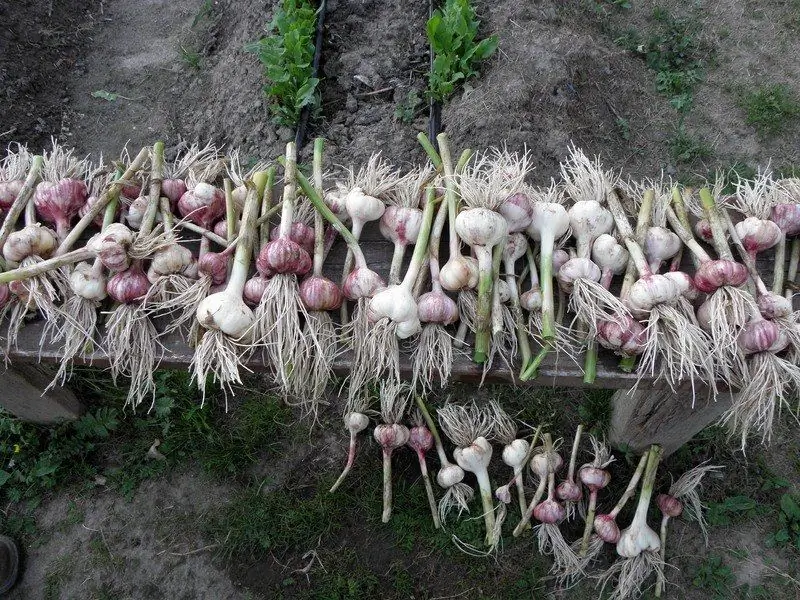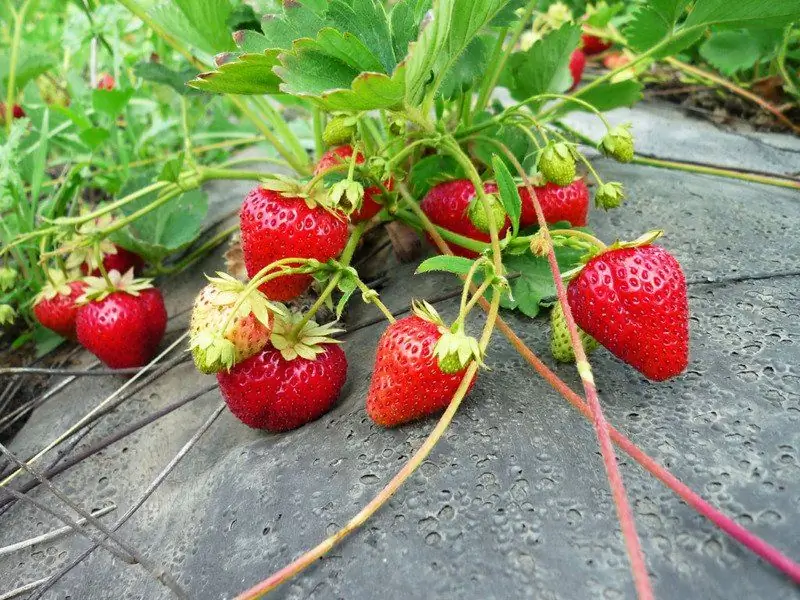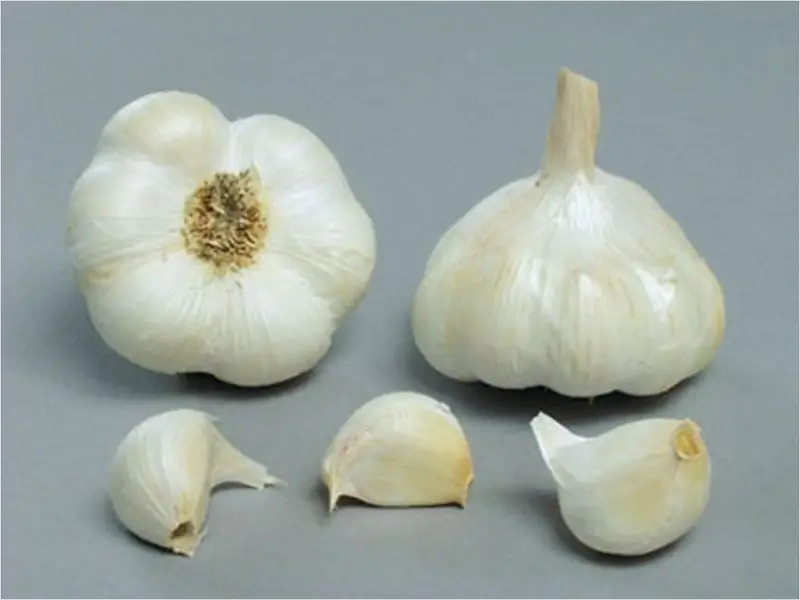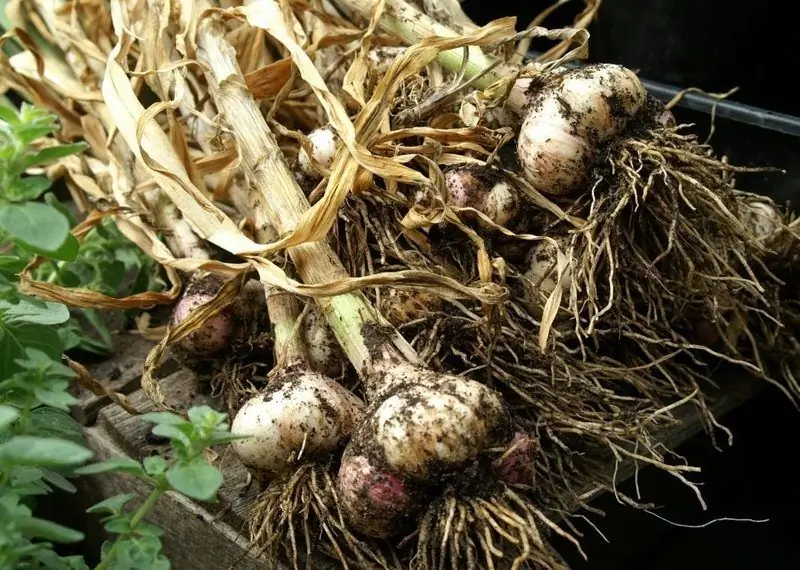
Table of contents:
- Author Bailey Albertson albertson@usefultipsdiy.com.
- Public 2023-12-17 12:53.
- Last modified 2025-01-23 12:41.
What can be planted after garlic in July so that the beds are not empty

Winter garlic is dug up in July. After harvesting, empty beds remain, and the question arises of what can be planted in the vacant space. It is still far from the end of the season, and I do not want the garden to be empty and overgrown with weeds.
What can you plant after garlic in July
After harvesting garlic, many novice gardeners think about planting other crops on the same garden bed. This approach is correct, since there are many options for using the vacated site. A number of plants have a short growing season, so it is possible to get a second crop in the same place. It is only necessary to select crops that are not sensitive to changes in the length of daylight hours and temperature changes.

Winter garlic is dug up in July
Experienced agronomists assure that after garlic it is better to plant cucumbers, vegetables from the nightshade family, greens. Cucumbers in the second half of summer grow well in the southern regions. When growing them in central Russia, you should take care of the covering material and arcs in advance. If the nights are cold, you can make a small mobile greenhouse. To reduce the risks, you can take care of planting seedlings in advance and transplant them into open ground immediately after harvesting the garlic.
You can plant a black radish after garlic. In July, varieties suitable for winter storage are sown. After garlic, radish grows well. Reduced daylight hours have a beneficial effect on the growth of this culture. Radishes are best sown in early August. In July, you can plant varieties that are resistant to shooting.

Black radish can be planted in July after garlic harvest
After garlic, greens grow well. You can plant dill in the vacant space. In August, it will already be possible to cut greens.
At the end of July, after harvesting garlic, I have been planting bush dill for several years in a row. I like the Alligator variety. Its green mass is growing rapidly. The leaves of this dill are juicy. This option is almost a win-win. Dill grows well and always pleases with the harvest. If the summer is very hot, I shade the plantings with any covering material so that the leaves do not become coarse.

Dill Alligator can be planted in the garden after garlic
After harvesting the garlic, the garden bed can be sown with green manure (mustard, oats, barley, legumes). These plants enrich the soil and prepare it perfectly for the next season. In the southern regions, peas and even beans have time to ripen.
What not to plant after harvesting garlic
Bulbous crops should not be planted after garlic. All bulbous plants suffer from the same pests (the most common is the onion fly), suffer from the same diseases (peronosporosis), therefore, it is necessary to refrain from planting them on a garlic bed for at least 2-3 years. There are no restrictions for other vegetables and herbs. In this case, it is worth considering the growing season. Crops with a long growing season simply do not have time to mature before the onset of cold weather.
After harvesting the garlic, there is no point in planting:
- tomatoes;
- pepper;
- eggplant;
- late and mid-season carrot varieties;
- beets;
- cabbage.
Ultra-early ripening varieties of carrots (Bureau, Children's Joy) have every chance to please with the harvest, even if sowed late in the garden. In this case, it is possible to obtain beam products unsuitable for long-term storage.
Beets and cabbage should not be planted in the garden at the end of July, since these crops are sensitive to the length of daylight hours and, with late sowing, may go into the arrow or not set.
After harvesting the garlic in July, you can use the garden bed for a second harvest. It can be used to grow greens, radishes, cucumbers, radishes, legumes. It is not recommended to plant onions on the garden bed, even if we are talking about early varieties with a short growing season.
Recommended:
What To Do If, After Flashing Android, The Phone Or Tablet Does Not Turn On, Does Not See The Network, Does Not Charge

Why does my smartphone or tablet not work after changing the Android version. How to troubleshoot various problems. How to properly reflash a device
What To Plant After Strawberries Next Year And What Not To

Strawberry crop rotation rates: which crops can be planted and which ones are better not to plant after strawberries
How Many Days After The Act Can You Find Out About Pregnancy, Learn About Conception By The Test, Before The Delay And After

When the first signs of pregnancy appear. When to take a pregnancy test. Blood test for hCG. Ultrasound to detect pregnancy. External signs
Planting Garlic In Spring In Open Ground: When And How To Plant It Correctly, Instructions

How to plant garlic in spring in open ground: step by step instructions for preparing, planting and caring for the crop
What To Plant After Garlic And Onions For The Next Year And What To Combine Planting With

What are the rules of crop rotation based on, what do they advise to plant after onions and garlic, and what is prohibited. What can be planted next to them
